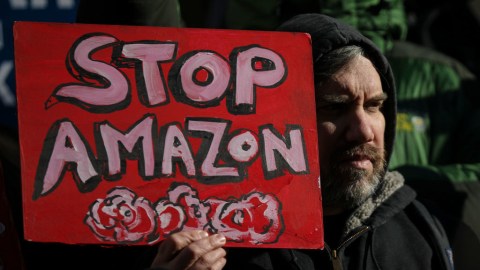Why Amazon canceled its plan to build HQ2 in NYC

- Amazon had spent years on a controversial campaign to select cities where it plans to build giant corporate campuses.
- In November, the retail giant announced plans to build its so-called HQ2 in Virginia and New York.
- On Thursday, Amazon cancelled its plans to build in New York following backlash from local lawmakers, union leaders, and protestors.
Amazon has cancelled its plans to build a headquarters building in New York City after facing backlash from local lawmakers and others opposed in the community.
The deal had allocated some $3 billion in local and state tax incentives for Amazon, which in return promised to create some 25,000 jobs with average wages of about $150,000. It was these supposed benefits that caused hundreds of cities across the nation to spend millions to try, in vain, to woo the world’s largest online retailer to plant down roots.
But it came as little surprise, at least to some, when Amazon announced in November that the site of its so-called HQ2 would be New York City — a decision publicly celebrated by Gov. Andrew M. Cuomo and Mayor Bill de Blasio.
There was reason to celebrate. Sure, New York City would have to spend big on a record-setting $3 billion incentive package, but it would’ve surely gotten a much bigger return on that investment in the form job creation and tax revenue. But at what costs? Critics said the bulk of these supposed benefits would not go to locals, but rather to outside talent who’d move to the nearby neighborhoods and drive up rent prices — a familiar pattern in a city where rent prices are already forcing out long-time residents. In fact, mere rumors of Amazon’s plans to build a corporate campus in Long Island City seemed to spark a condo frenzy, as The Wall Street Journalreported.
One of the most instrumental opponents of the deal was Sen. Michael N. Gianaris (D-Queens), who serves as deputy majority leader of the New York State Senate and was recently appointed to the Public Authorities Control Board — a legislative body that had the power to effectively kill the project, as noted by The Washington Post.
“Amazon has extorted New York from the start, and this seems to be their next effort to do just that,” Gianaris said. “If their view is, ‘We won’t come unless we get $3 billion of your dollars,’ then they shouldn’t come.”
Cuomo said the senate’s attempts to stop the deal amounted to “governmental malpractice.”
“It’s a very small group of politicians who are pandering,” Cuomo said last week. “The problem is the state senate has adopted that position, and that’s what could stop Amazon. And if they do, I would not want to be a Democratic senator coming back to my district to explain why Amazon left.”
But Gianaris said the move was prompted by community concerns.
“Like a petulant child, Amazon insists on getting its way or takes its ball and leaves,” Gianaris said. “The only thing that happened here is that a community that was going to be profoundly affected by their presence started asking questions.”
Gianaris and fellow Democrat City Council Member Jimmy Van Bramer also said it was “unfathomable” to give Amazon such a big incentive package when “our subways are crumbling, our children lack school seats, and too many of our neighbors lack adequate health care.” Lawmakers opposed to the deal would’ve likely been able to throw up legal and bureaucratic roadblocks in front of Amazon; for example, the Democrat-controlled Public Authorities Control Board requires unanimous approval for some parts of the deal, as noted by The Verge.
Still, polling suggests most New Yorkers supported the plan, as Amazon noted Thursday in a statement — it also pinpointed what led the company’s executives from moving forward:
“While polls show that 70 percent of New Yorkers support our plans and investment, a number of state and local politicians have made it clear that they oppose our presence and will not work with us to build the type of relationships that are required to go forward with the project we and many others envisioned in Long Island City.” (To be sure, some polling data showed less support, though still majority support.)
Corporate welfare?
Many Americans believe that spending taxpayer money on corporate investment will only benefit the rich, as Ari Ginsberg, professor of entrepreneurship and management at New York University’s Stern School of Business, wrote in an opinion piece for The Hill.
“… government officials seeking to make deals based on economic cost-benefit analysis need to start realizing that there is more than just a bottom line,” Ginsberg wrote. “They must recognize that public unease is stemming from the perception that economic growth primarily benefits the wealthiest segments of society while marginalizing the disadvantaged.”
The precise effects of corporate subsidies are unique to each deal, but it’s worth noting that even when government deals help lead Amazon to create thousands of jobs in a given location, those jobs typically aren’t lucrative, and they often come at the cost of thousands more lost retail jobs.
It’s thanks in part to patterns like these that some Wisconsinites are opposed to the shaky Foxconn deal for Milwaukee, in which the tech giant would receive some $4.1 billion in state subsidies for investing $10 billion in a manufacturing plant that it said would create 13,000 jobs. But over the past year Foxconn has seemed to scale back its promises on investing in the state, causing many taxpayers to worry they’d never see a return on their $1,774-per-household investment.
Some say the cost of each job created by the deal is simply too high.
“Realistically, the payback period for a $100,000 per job deal is not 20 years, not 42 years, but somewhere between hundreds of years and never,” wrote Jeffrey Dorfman, an economics professor at the University of Georgia, for Forbes. “At $230,000 [or more] per job, there is no hope of recapturing the state funds spent.”





